Earn Your Doctor of Physical Therapy Degree at Maine’s Leading Health University
On our Portland, Maine campus, we use a unique curriculum to connect your knowledge to real clinical scenarios, develop your critical thinking, and enhance your ability to evaluate and treat patients through a holistic lens to provide optimal care.
Through a mix of classroom instruction, lab and simulation learning, and clinical experiences, you are prepared to help patients and communities improve mobility, recover from injury or surgery, manage chronic conditions, prevent future injuries, and achieve optimal health and wellness. Expert faculty immerse you in cutting-edge research and best practices while mentoring you in all aspects of physical therapy.
By starting your PT career with UNE, Maine’s premier health care university, you’ll graduate as a well-rounded professional who is ready to make a difference in patient care.
Why UNE for Your Doctor of Physical Therapy Degree
- You’ll be supported to succeed in your PT career. One hundred percent of UNE D.P.T. graduates are employed within one year of graduation (2024 survey).
- Earn your D.P.T. in less time — only seven semesters.
- Learn in a unique case-based format for a stronger understanding of clinical applications and enhanced critical thinking skills.
- Experience all areas of physical therapy practice to prepare you for diverse career options.
- Earn honors recognition interprofessional collaboration, participate in a rural health scholars program or our Leadership Education in Neurodevelopmental and Related Disabilities program.
- Learn in a culture that fosters a professional, collegial, and collaborative environment in which all people can thrive.
- UNE’s expert faculty are established PT leaders who take the time to engage with and mentor each student.
- Learn how to collaborate in today’s team-based health care by training alongside UNE students who are future Physicians, Nurses, and other health professionals.
of UNE D.P.T. graduates passed the national licensing exam
of UNE D.P.T. graduates passed the national licensing exam on their first attempt
of UNE D.P.T. graduates surveyed were employed within one year of graduation
Discover UNE’s Doctor of Physical Therapy Program
What will you study? PT Program Curriculum Overview
Situated on Maine’s scenic coast, UNE’s Doctor of Physical Therapy program uses case-based coursework, labs and simulation, and clinical experiences to strengthen critical thinking and equip you to excel as a skilled clinician. The curriculum starts with foundational sciences, focusing on human structure and function, before progressing to evidence-based physical therapy management of impairments, functional limitations and disabilities. This comprehensive approach aims to prepare you for real-world clinical practice by integrating theoretical knowledge with practical skills.
The required courses will be organized by horizontal threads and total 96 credits.
Science of Movement
Students learn the relevant gross anatomy, histology, kinesiology, physiology, and neuroscience for understanding cardiovascular, pulmonary, neuromuscular, musculoskeletal, integumentary, and other body systems that comprise the human movement system. Students learn anatomy, physiology and related sciences to understand human movement. The program covers major body systems through lectures and labs. Hands-on work includes computer simulations, cadaver studies and physical assessments. This approach combines science with practical skills for clinical practice.
Patient/Client Management
The Patient/Client Management Model guides physical therapy practice. It includes examining patients, evaluating findings, diagnosing issues, predicting outcomes, planning interventions and developing care plans. Students learn to manage patients with various health conditions using real-life cases. The program emphasizes patient safety, education, therapist body mechanics, infection control and documentation. Evidence-based practice is a core focus throughout the curriculum.
Health and Human Development
This thread outlines the cognitive/learning, cultural, economic/financial, physical, and social/emotional domains of health. Students explore each domain across the lifespan, and in the process develop a deep understanding of themselves and the life circumstances of their future patients. Students also learn about health informatics, quality improvement, health care systems, community health, and interprofessional collaborative practice within this thread.
Professional Roles and Responsibilities
This thread educates students on psychosocial aspects of patient care, treating diverse populations, global health issues, and health justice. Students learn about ethics, policy, and patient advocacy. The curriculum includes business leadership and management skills. Evidence-based decision-making is emphasized throughout, readying graduates for practice in a complex, evolving healthcare environment.
Clinical Education
This thread prepares students for clinical practice by developing professional behavior, interprofessional skills, cultural humility, personal leadership and clinical decision making. Courses include didactic and integrated clinical experiences (ICE) that support the integration of knowledge and clinical skills through early patient interaction in various clinical settings. This thread prepares students for their full-time clinical education experiences.
Students complete 30 weeks of full-time clinical experiences throughout the program. These include:
- A two-week experience at the start of the curriculum to give you early exposure to the clinical setting.
- A six-week placement embedded in the middle of the curriculum to provide you with the chance to practice what you have learned so far.
- A 10-week experience and a 12-week terminal experience at the end of the curriculum to give you the hands-on experience that will prepare you for clinical practice.
This structure provides progressively more intensive hands-on training to fully prepare you for your career in physical therapy.
Upon finishing the program and earning your degree, you may sit for the National Physical Therapy Exam and then enter the profession.
Curriculum
The Doctor of Physical Therapy (D.P.T.) program is seven (7) semesters in length and includes a combination of classroom coursework, laboratory coursework, and four (4) full-time clinical education experiences. In addition to the ninety-six (96) required credits, students are invited to take elective coursework offered by the department.
| Program Required Courses* | Credits |
|---|---|
| PTH 526 – Human Anatomy for the Physical Therapist | 6 |
| PTH 528 – Intro to the Profession: Becoming a PT | 1 |
| PTH 529 – Intro. to Healthcare Education | 1 |
| PTH 551 – Science of Movement 1 | 6 |
| PTH 552 – Patient/Client Management 1 | 5 |
| PTH 553 – Health and Human Development 1 | 2 |
| PTH 554 – Professional Roles & Responsibilities 1 | 2 |
| PTH 555 – Clinical Education 1 | 1 |
| PTH 557 – Clinical Education Experience IA | 2 |
| PTH 561 – Science of Movement 2 | 6 |
| PTH 562 – Patient/Client Management 2 | 5 |
| PTH 563 – Health and Human Development 2 | 2 |
| PTH 564 – Professional Roles & Responsibilities 2 | 2 |
| PTH 565 – Clinical Education 2 | 1 |
| PTH 611 – Science of Movement 3 | 5 |
| PTH 612 – Patient/Client Management 3 | 5 |
| PTH 613 – Health and Human Development 3 | 2 |
| PTH 614 – Professional Roles & Responsibilities 3 | 2 |
| PTH 615 – Clinical Education 3 | 1 |
| PTH 621 – Science of Movement 4 | 3 |
| PTH 622 – Patient/Client Management 4 | 3 |
| PTH 623 – Health and Human Development 4 | 2 |
| PTH 624 – Professional Roles & Responsibilities 4 | 2 |
| PTH 625 – Clinical Education 4 | 1 |
| PTH 626 – Capstone Experience | 1 |
| PTH 627 – Clinical Education Experience 1B | 4 |
| PTH 631 – Science of Movement 5 | 2 |
| PTH 632 – Patient/Client Management 5 | 3 |
| PTH 633 – Health and Human Development 5 | 1 |
| PTH 634 – Professional Roles & Responsibilities 5 | 1 |
| PTH 635 – Clinical Education 5 | 1 |
| PTH 637 – Clinical Education Experience 2 | 7 |
| PTH 717 – Clinical Education Experience 3 | 8 |
| Minimum Total Required Credits | 96 |
|---|
*Please note: Curriculum is subject to change.
Conferring the Doctor of Physical Therapy degree is contingent upon the successful completion of academic and clinical coursework, including a total of ninety-six (96) academic credits.
Academic and Technical Standards
Academic Standards
The Department of Physical Therapy, the Westbrook College of Health Professions, and the University of New England are committed to offering a quality physical therapist education program that complies with the evaluative criteria of the Commission on Accreditation in Physical Therapy Education. The program provides learning experiences to enable graduates to achieve the outcomes required for the practice of physical therapy. Please refer to the WCHP Graduate Program Progression Policies and Procedures (PDF) for a detailed description of academic standards.
Essential Technical Standards
The Essential Technical Standards support the admission, promotion, and graduation of students in the University of New England Doctor of Physical Therapy Program. Physical therapy is an intellectually, physically, and psychologically demanding profession. It is during the prescribed curriculum that students begin to develop the qualities necessary for practice as a physical therapist. Students acquire the foundation of knowledge, attitudes, skills, and behaviors needed for the physical therapists’ professional careers. The abilities that physical therapists must possess to practice safely and competently are reflected in the technical standards that follow. The standards apply to all program activities, including those taking place in classroom, laboratory, and clinical settings. The obligation of the D.P.T. program is to produce effective and competent physical therapists who are able to serve the needs of society. Therefore, all students will be held to the same standards.
Candidates for the Doctor of Physical Therapy (D.P.T.) degree must be able to meet these minimum standards, with or without reasonable accommodations, for successful completion of degree requirements.
Please review this document carefully to determine whether you possess the abilities and skills reflected in the technical standards below.
Technical Standards: Abilities and Skills
Reflected in the standards that follow are those abilities and skills that students must possess to engage safely and competently in all program activities, including those taking place in classroom, laboratory, and clinical settings. The abilities and skills are described in five domains, including observation skills; communication skills; motor skills (fine and gross); intellectual-conceptual, integrative, and quantitative abilities; and behavioral and social/emotional attributes.
Observation
Observation requires the functional use of vision, hearing, and somatic sensations. A student must be able to observe lectures, laboratory dissection of cadavers, and lecture and laboratory demonstrations in person. The student must be able to observe a patient accurately, observe digital and waveform readings, and other graphic images to determine a patient’s condition. Examples in which these observational skills are required include: palpation of peripheral pulses, bony prominences, and ligamentous structures; visual and tactile evaluation for areas of inflammation; and visual and tactile assessment of the presence and degree of edema or other changes in the skin and underlying tissues.
Communication
Communication includes: speech, language, reading, writing, and computer literacy. Students must be able to communicate effectively and sensitively with patients to elicit information regarding affect and functional activities, as well as perceive non-verbal communications. Students must also be able to communicate effectively and efficiently in person and in writing with other members of the health care community to convey information essential for safe and effective care.
Motor
Students must possess sufficient motor function and strength to elicit information from the patient examination, examples include palpation, auscultation, tapping, manual muscle testing, and other examination maneuvers. Students must be able to execute movements required to provide general and therapeutic care, examples include: safely lifting, transferring, and positioning large, heavy, and/or immobile patients and guard during gait training, using assistive devices and orthotics. Students must possess sufficient motor function and strength to be able to learn and then demonstrate the ability to position themselves and patients, perform manual mobilization techniques, perform non-surgical wound debridement, and place electrodes. Learning these skills and performing necessary physical therapy techniques on patients requires coordination of both gross and fine motor skills, sufficient strength, mobility, endurance, balance, proper body mechanics, and the integrated use of touch and vision, or the functional equivalent.
During the curriculum, students are required to perform motor skills representative of licensed physical therapists working with patients in a variety of settings.
Intellectual-Conceptual, Integrative, and Quantitative Abilities
To effectively solve problems, students must be able to measure, calculate, reason, analyze, receive information visually and through communication and examination, and process, integrate and synthesize that information quickly, sometimes immediately, and, at times, under stressful and chaotic conditions. For example, the student must be able to quickly and accurately synthesize knowledge and integrate the relevant aspects of a patient’s history and examination findings, accurately assess the patient and develop an effective treatment program. In addition, students must be able to comprehend three (3)-dimensional relationships and to understand spatial relationships of structures.
Behavioral and Social/Emotional Attributes
A student must possess the psychological ability required for the full utilization of their intellectual abilities, for the exercise of good judgment, for the prompt completion of all responsibilities inherent to patient care, and for the development of mature, sensitive, and effective relationships with patients, colleagues and other health care providers. Students must be able to tolerate physically and mentally taxing workloads and function effectively under stress. They must be able to adapt to a changing environment, display flexibility and learn to function in the face of uncertainties inherent in the clinical problems of patients. As a component of their education, students must act professionally and maturely and demonstrate ethical behavior commensurate with the profession of physical therapy.
REASONABLE ACCOMMODATIONS
The University of New England Physical Therapy Program welcomes qualified learners with disabilities and encourages students to make requests for accommodations early in the program. The program is committed to providing equal access through the use of reasonable accommodations for students who are otherwise qualified and able to satisfy the technical standards listed above and the academic requirements of the program with or without accommodation. Candidates who, after review of the technical standards, determine that they require reasonable accommodation to fully engage in the program should contact the Student Access Center to schedule a confidential access consultation. Given the nature of our program, timely requests are essential and encouraged because time may be needed to create and implement approved accommodations. Because requests for retroactive accommodations are not reasonable and will not be granted, students should seek accommodations early in the program if they believe that they will need accommodations at some point in the program.
To learn more about the program visit the Academic Catalog.
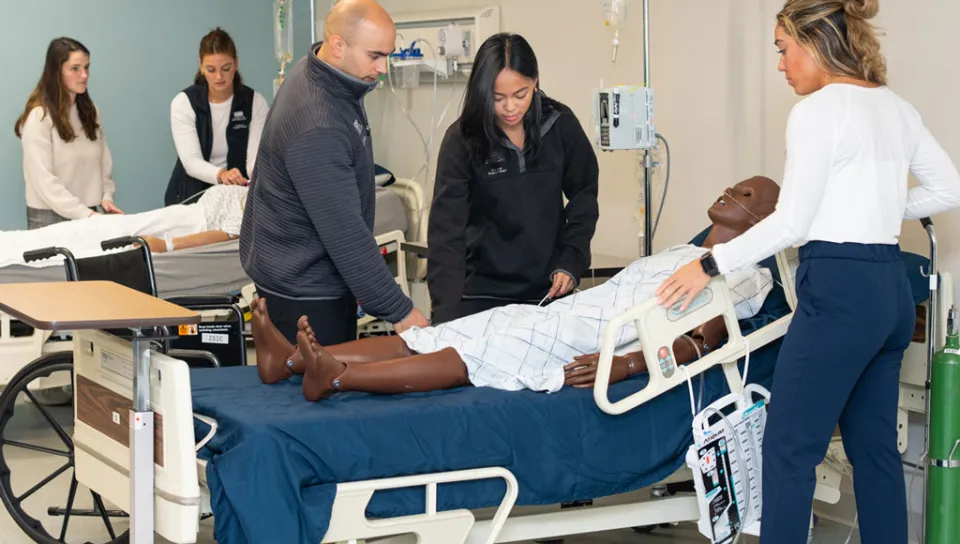
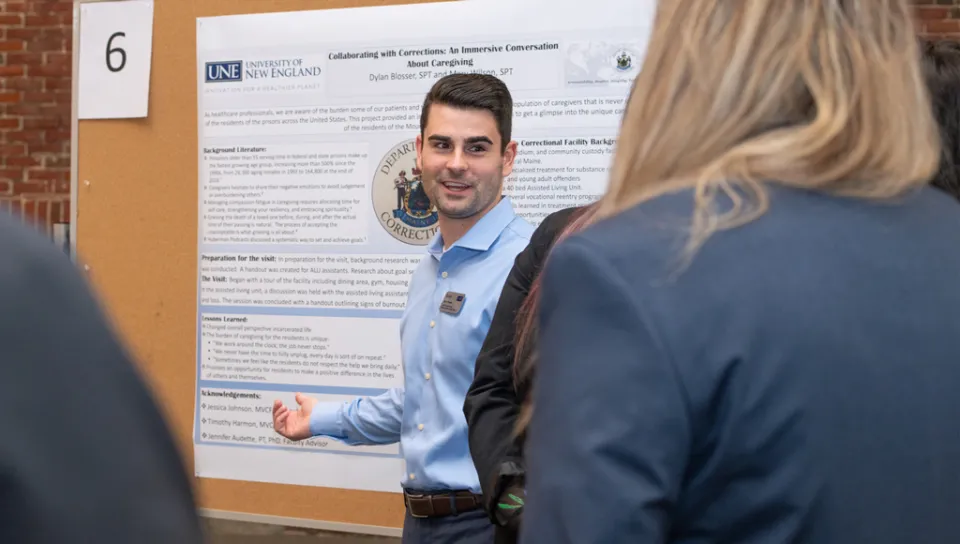
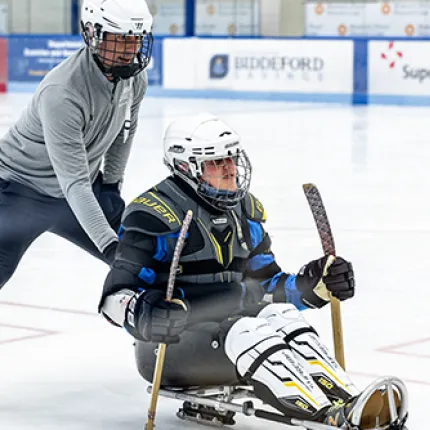
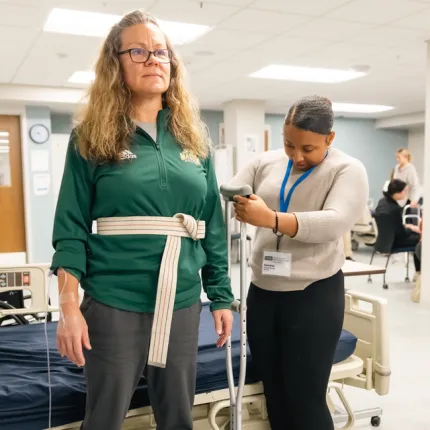
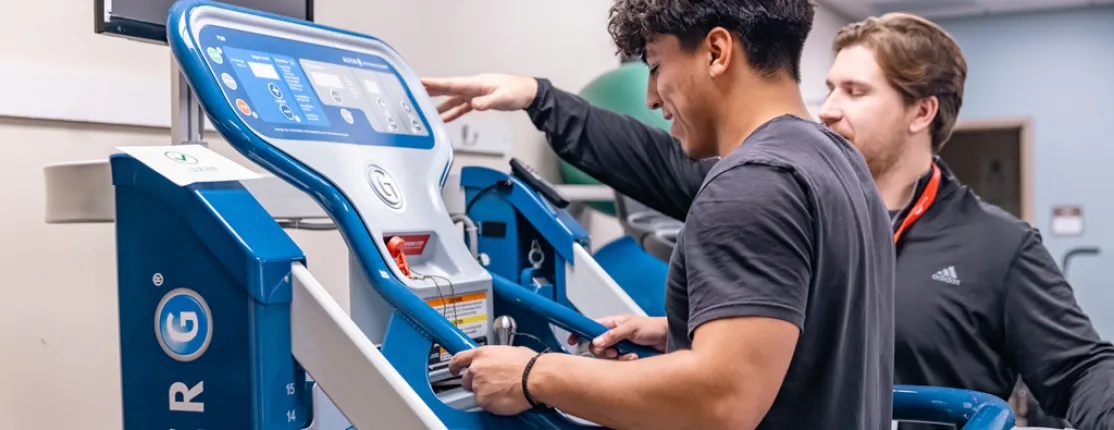
Career Paths for Physical Therapy Grads
Physical therapy is a dynamic and rewarding profession that enables you to make a difference in people’s lives. You provide services to those with impairments, functional limitations, disabilities, or changes in physical function due to injury, disease, or other causes. Drawing upon your theoretical and clinical knowledge, you help them preserve, develop, and restore optimal physical function.
As a graduate of our program, you are highly regarded in the physical therapy marketplace. Our graduates enjoy a record of virtually 100 percent employment within the first six months after receiving their degree and passing the National Physical Therapy Exam.
Doctor of Physical Therapy Facilities
Our classrooms and labs are furnished with equipment to enable instruction in adult and pediatric neuromuscular, integumentary, cardiovascular pulmonary, and musculoskeletal systems.
Labs take place in “skill labs,” which are modeled after clinical environments, enhancing a student’s ability to practice in any health care setting. The classrooms are equipped with computer and video technology, allowing you to use multimedia presentations to meet varying learning needs. Additional learning spaces include the Motion Analysis Lab and Interprofessional Simulation and Innovation Center.
Harold and Bibby Alfond Center for Health Sciences
The Harold Alfond Center for Health Sciences is a state-of-the-art laboratory and educational facility. This four-story building houses labs and lecture halls for our health professions programs and places UNE at the national forefront of health and life sciences education. As a UNE PT student, you use the center’s gross anatomy and clinical skills labs throughout the program.
Human Sensory and Motor Performance Laboratory
The Human Sensory and Motor Performance Laboratory is a three-room shared research space in Blewett Hall on UNE’s Portland Campus.
The lab is dedicated to the measurement of pain and neuromuscular performance. Each room is approximately 200 sq ft., contain treatment tables, and are situated to allow investigators to perform blinded evaluations.
Equipment available for research testing includes a Medoc TSAII Neurosensory Analyzer and pain testing algometers; a GE Logiq E diagnostic ultrasound; hand-held dynamometry; and a transcranial magnetic and direct current stimulation units.
Interprofessional Simulation and Innovation Center
As a D.P.T. student, you utilize our Interprofessional Simulation and Innovation Center (ISIC) to apply the knowledge you gain in the classroom to realistic clinical situations without putting actual patients at risk.
Motion Analysis Lab
The Motion Analysis Lab allows you to observe and measure human motion that cannot be observed with the naked eye, and to quantify the forces in the joints and neuromuscular and muscle systems.
The research you do in this technologically-advanced, 1500-square-foot learning space allows you to apply the theoretical knowledge you learn in the classroom to projects investigating such crucial matters to your field as better understanding the laws of sports biomechanics or the most effective approaches to ACL rehabilitation.
Physical Therapy: Team-Based Learning
Our Portland Campus surrounds you with faculty and students in several other health disciplines. You will participate in interprofessional learning activities with them, and come to better understand how the work you’ll do will depend on collaboration. You will learn how to collaborate in today’s team-based health care environment as a member of our vibrant health sciences community.
Maine is an ideal location for living and learning. If you are seeking a physical therapy school in Maine, the UNE program is unsurpassed for student outcomes and experience.
Meet UNE D.P.T. students
A Health Care Education Campus in Portland, Maine
UNE D.P.T. students study on the Portland Campus for the Health Sciences, a quintessential New England quad that has been welcoming students for more than a century. Lined with lush trees and brick buildings, the campus sits in a quiet neighborhood just a short drive from the downtown waterfront. Portland, named “America’s Most Livable City” by Forbes and “Foodiest Small Town in America” by Bon Appetit, is about 100 miles from downtown Boston.
Who can apply to our physical therapy degree program?
To apply to our PT degree program, you must hold a bachelor’s degree from a U.S. regionally accredited institution, or international equivalent.
The University of New England Department of Physical Therapy participates in the Physical Therapist Centralized Application Service (PTCAS). All applicants are required to apply online through this service.
Financial Aid at UNE
Finance your education through loans, grants, and scholarships. We are committed to making our phyiscal therapy degree program as affordable as possible.
Accreditation
The Doctor of Physical Therapy program at the University of New England is accredited by the Commission on Accreditation in Physical Therapy Education (CAPTE), 3030 Potomac Ave., Suite 100, Alexandria, VA 22305-3085; telephone: (703) 706-3245; email: accreditation@apta.org; website:
http://www.capteonline.org; If needing to contact the UNE PT program directly, please call (207) 221-4590 or email ptdepartment@une.edu
Graduation and NPTE Outcomes Data (PDF)
Other concerns outside the realm of due process should be directed to the D.P.T. program director or to the dean of the Westbrook College of Health Professions.
Apply Today
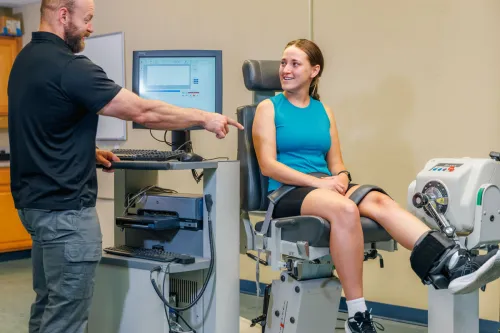
PT Degree Frequently Asked Questions
How do you become a physical therapist?
If you want to become a physical therapist, you should be interested in anatomy and physiology. In physical therapy school at the Portland, Maine campus of UNE, you learn by doing. That means that in addition to your studies, you will help patients rehabilitate from injuries, manage chronic conditions, avoid surgery or create healthy habits. You will learn about research on the forefront of physical therapy, as well as managing professional and business issues related to a physical therapist practice.
The entry-level degree to become a physical therapist is the Doctor of Physical Therapy degree (D.P.T.), which is a clinical doctorate. Having a bachelor’s degree in biology, exercise science, kinesiology, or a related field helps set the foundations for PT school.
You will also need to pass the National Physical Therapy Exam and obtain a state license in the state where you plan to practice. Learn more about the NPTE and PT state licensing
What’s the best physical therapy school for me?
Choosing the best physical therapy school for you is a matter of weighing academic quality as well as social fit and long-term value. At UNE in Portland, Maine you will be taught by faculty with a long, successful history in the field of physical therapy. In 2024, 89% of our graduates passed the national licensing exam on their first attempt, and 100% are employed within one year of graduation.
At UNE, our physical therapy degree is best for people who are looking to form a tight bond with their peers and work with students in other fields through our state-of-the-art facilities. The Portland campus houses all the graduate health sciences programs. This interprofessional learning will set you up for success when speaking to peers in other fields. Our student to faculty ratio is kept low, so you’re able to form a close relationship with your professors, and them with you.
Studying abroad can also be an important part of your physical therapy degree. At the University of New England, we believe strongly in the benefits of an international experience for physical therapy students. UNE has both short-term and longer-term physical therapy-related opportunities abroad.
At UNE, our physical therapy students are passionate about their studies. But what better place to unwind than Portland, Maine? In addition to the outdoor activities, food, arts, beer, and very cool vibe, Portland provides a rich variety of settings for UNE students to learn and become involved in service and social activities.
What are physical therapy school requirements?
The first basic requirement for physical therapy school is a bachelor’s degree.
The UNE physical therapy degree program accepts students with a variety of undergraduate degrees including exercise science, kinesiology, biology, psychology, philosophy, dance, and others. As long as you complete the prerequisites, any undergraduate major is fine.
Some physical therapy schools may require that you have a specific bachelor’s degree. Depending on your degree and the requirements of your selected physical therapy school, you may need to complete postgraduate coursework that satisfies the prerequisites.
How much do physical therapists make?
Salaries for physical therapists vary widely based on type of practice, practice setting, years of experience, and where you live. The average annual salary for physical therapists nationally is about $101,020, according to the Bureau of Labor in May 2024. The American Physical Therapy Association carries out a Workforce Data Report every few years.
UNE D.P.T. graduates are employed all over the country in a wide variety of practice settings, including hospitals, rehabilitation centers, home care, schools, and outpatient clinics. There is a high demand for physical therapists in every state, and Maine itself has a high concentration of physical therapy jobs.
What’s the difference between PT and OT?
Physical therapy and occupational therapy work together frequently, and these disciplines have similarities as well as important distinctions. Physical therapists (PTs) focus on improving the patient's ability to move their body. They help individuals to maximize mobility, manage pain and chronic conditions, avoid surgery, and prescription medications, and improve overall physical function and fitness. An occupational therapist (OT) is ultimately concerned with how a client accesses and participates in activities that hold meaning within day-to-day functioning. OTs work with clients to modify their approach to activities to better support their engagement and participation in the things they want to do.
As a student in UNE’s D.P.T. degree program in Portland, Maine, you have the opportunity to collaborate with our occupational therapy faculty and students in classroom and clinical settings. UNE is one of a handful of private universities with a comprehensive health education mission that encourages interprofessional learning opportunities.
